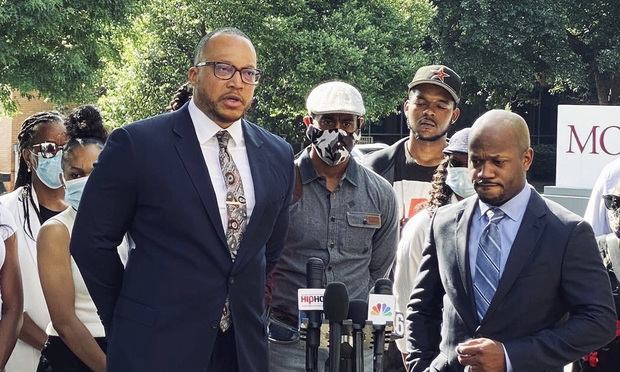Lawyers for Assaulted College Students: Charging Abusive Cops Could 'Stop the Nonsense'
"If officers knew that tasing somebody or beating up somebody not only was going to get them fired, but also possibly arrested, all this nonsense would stop," said L. Chris Stewart of Stewart Trial Attorneys.
June 02, 2020 at 06:50 PM
4 minute read
 Justin Miller, left, and L. Chris Stewart of Stewart Trial Attorneys.
Justin Miller, left, and L. Chris Stewart of Stewart Trial Attorneys.
Criminal assault charges filed in Atlanta on Tuesday against police officers for yanking college students out of their car, tasing them and slamming them onto the pavement—caught on live television—offer the clue to finding justice and calming the unrest in cities around the country, according to lawyers for the victims.
"It's really important. It's just an example of accountability," L. Chris Stewart of Stewart Trial Attorneys in Atlanta told the Daily Report on Tuesday. "If officers knew that tasing somebody or beating up somebody not only was going to get them fired, but also possibly arrested, all this nonsense would stop."
Stewart and his partner Justin Miller represent Taniyah Pilgrim, the 20-year-old Spelman College student who was pulled from her car, tased, slammed onto the ground, handcuffed and held for three hours in a police van with other women and denied COVID-19 protective masks, according to Fulton County District Attorney Paul Howard.
Stewart and Miller are working with civil rights attorney Mawuli Mel Davis of the Davis Bozeman Law Firm in Decatur, who is representing 22-year-old Morehouse College student Messiah Young. Young was Pilgrim's date for the night of May 30 when the two were caught in the protest traffic as they were going out for something to eat, according to their attorneys and the district attorney. Young also suffered a broken arm, 23 stitches and a night in jail, Howard said.
"They were extremely innocent—almost to the point of being naive," Howard said of the two students in announcing during a live streamed news conference that he was arresting six police officers. "They were two of the nicest people we've ever had the opportunity to meet in the DA's office."
Those indictments against the police officers included charges for: aggravated assault, simple battery, destruction of property (for smashing Pilgrim's car windows) and pointing a weapon at a person.
Howard said the reason he was able to bring the charges is that the entire incident was caught on video—from a television station and police body cameras. Often in such cases, no video is available and the victims are dead, the district attorney said.
Video—often recorded on smartphones—has become the star witness in a string of assaults and killings by police officers or their surrogates. Stewart has represented many of the families of those victims. He and Miller said people are wrong if they think such events are happening more often. They're just being documented more often.
"History is not moving backwards. Technology is moving forward," Miller said.
Stewart and Miller said they generally support police—just not police abuse.
"We don't have an issue with the police generally," Miller said. "But the issue that society was seeing is that when you don't balance the scales at all, when cops can do anything with impunity, that causes all this inequality and it causes all this pent up aggression that we've been seeing as well. Something has to change with the police or else it's going to continue."
Stewart and Miller are also part of the legal team representing the families of Ahmaud Arbery, killed in Brunswick, and George Floyd, killed in Minneapolis. They are working with Ben Crump and S. Lee Merritt for those families, as well as the family of Breonna Taylor, who was shot multiple times in her own bed when police broke into her Louisville, Kentucky, apartment by mistake with a no-knock warrant.
Stewart and Miller spoke as they were landing in Minneapolis and heading to a news conference where they are still calling for arrests of the officers who stood by as their colleague pressed his knee on George Floyd's neck for nearly nine minutes. Their client there is a 6-year-old girl who no longer has a father.
This content has been archived. It is available through our partners, LexisNexis® and Bloomberg Law.
To view this content, please continue to their sites.
Not a Lexis Subscriber?
Subscribe Now
Not a Bloomberg Law Subscriber?
Subscribe Now
NOT FOR REPRINT
© 2025 ALM Global, LLC, All Rights Reserved. Request academic re-use from www.copyright.com. All other uses, submit a request to [email protected]. For more information visit Asset & Logo Licensing.
You Might Like
View All


Trump RTO Mandates Won’t Disrupt Big Law Policies—But Client Expectations Might
6 minute read
Trump's RTO Mandate May Have Some Gov't Lawyers Polishing Their Resumes
5 minute readTrending Stories
- 1No Two Wildfires Alike: Lawyers Take Different Legal Strategies in California
- 2Poop-Themed Dog Toy OK as Parody, but Still Tarnished Jack Daniel’s Brand, Court Says
- 3Meet the New President of NY's Association of Trial Court Jurists
- 4Lawyers' Phones Are Ringing: What Should Employers Do If ICE Raids Their Business?
- 5Freshfields Hires Ex-SEC Corporate Finance Director in Silicon Valley
Who Got The Work
J. Brugh Lower of Gibbons has entered an appearance for industrial equipment supplier Devco Corporation in a pending trademark infringement lawsuit. The suit, accusing the defendant of selling knock-off Graco products, was filed Dec. 18 in New Jersey District Court by Rivkin Radler on behalf of Graco Inc. and Graco Minnesota. The case, assigned to U.S. District Judge Zahid N. Quraishi, is 3:24-cv-11294, Graco Inc. et al v. Devco Corporation.
Who Got The Work
Rebecca Maller-Stein and Kent A. Yalowitz of Arnold & Porter Kaye Scholer have entered their appearances for Hanaco Venture Capital and its executives, Lior Prosor and David Frankel, in a pending securities lawsuit. The action, filed on Dec. 24 in New York Southern District Court by Zell, Aron & Co. on behalf of Goldeneye Advisors, accuses the defendants of negligently and fraudulently managing the plaintiff's $1 million investment. The case, assigned to U.S. District Judge Vernon S. Broderick, is 1:24-cv-09918, Goldeneye Advisors, LLC v. Hanaco Venture Capital, Ltd. et al.
Who Got The Work
Attorneys from A&O Shearman has stepped in as defense counsel for Toronto-Dominion Bank and other defendants in a pending securities class action. The suit, filed Dec. 11 in New York Southern District Court by Bleichmar Fonti & Auld, accuses the defendants of concealing the bank's 'pervasive' deficiencies in regards to its compliance with the Bank Secrecy Act and the quality of its anti-money laundering controls. The case, assigned to U.S. District Judge Arun Subramanian, is 1:24-cv-09445, Gonzalez v. The Toronto-Dominion Bank et al.
Who Got The Work
Crown Castle International, a Pennsylvania company providing shared communications infrastructure, has turned to Luke D. Wolf of Gordon Rees Scully Mansukhani to fend off a pending breach-of-contract lawsuit. The court action, filed Nov. 25 in Michigan Eastern District Court by Hooper Hathaway PC on behalf of The Town Residences LLC, accuses Crown Castle of failing to transfer approximately $30,000 in utility payments from T-Mobile in breach of a roof-top lease and assignment agreement. The case, assigned to U.S. District Judge Susan K. Declercq, is 2:24-cv-13131, The Town Residences LLC v. T-Mobile US, Inc. et al.
Who Got The Work
Wilfred P. Coronato and Daniel M. Schwartz of McCarter & English have stepped in as defense counsel to Electrolux Home Products Inc. in a pending product liability lawsuit. The court action, filed Nov. 26 in New York Eastern District Court by Poulos Lopiccolo PC and Nagel Rice LLP on behalf of David Stern, alleges that the defendant's refrigerators’ drawers and shelving repeatedly break and fall apart within months after purchase. The case, assigned to U.S. District Judge Joan M. Azrack, is 2:24-cv-08204, Stern v. Electrolux Home Products, Inc.
Featured Firms
Law Offices of Gary Martin Hays & Associates, P.C.
(470) 294-1674
Law Offices of Mark E. Salomone
(857) 444-6468
Smith & Hassler
(713) 739-1250






